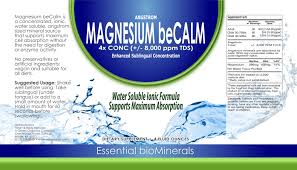Magnesium levels are a big deal when it comes to your health but not much attention is given to it. You are likely concerned about how to raise your magnesium because your doctor ran a test which showed low levels of magnesium in your blood.
We are here to help with that process and want to encourage you not to settle for some cheaply made magnesium supplement from your grocery store. There are several things you can do to get your magnesium levels up to normal levels.
We will provide those easy steps first and then explain why having good levels of magnesium is so important to your health.
5 Easy Steps to Boost Magnesium
- Check out HB Naturals Magnesium beCalm sublingual liquid magnesium which will provide almost 300 mg per dropper after being absorbed under your tongue.
https://shophbn.com/magnesium.asp?sponsorsite=747036
- Make sure you stay stocked up on a variety of nuts and seeds, especially cashews and add them to salads or eat them as snacks,
- Try to increase your weekly intake of fish such as salmon, sardines, trout or mackerel,
- Make sure you add some raw spinach and avocado to your salad dishes, and
- When fixing rice dishes, replace the rice with quinoa.
In case you are curious, quinoa provides 118mg per serving, mackerel provides 108 mg per serving, and cashews provide 80mg per serving.
Now that you know how to raise your magnesium levels by following these 5 easy steps, let’s take a look at what magnesium does for your over-all health.

Why Is Magnesium So Important?
Magnesium is one of the most prevalent mineral compounds found in the human body and it is constantly being used in numerous enzyme reactions needed for optimal health.
It is involved in our muscle’s ability to relax and supports the building of chemicals that regulate mood, normal blood pressure, blood sugar stability, our body’s metabolism, calcium formation for strong bones, AND establishing a healthy nervous system. WOW!
Imagine the things that can suffer if we don’t maintain strong levels of magnesium in our system.
It has have been shown in some long-term studies that subjects with high regular high intakes of magnesium translated into longer and healthier life spans.
Yet, amazingly, more than 75% of Americans are not getting the recommended dietary allowance of 300-400 mg daily, according to The National Diet and Nutrition Survey.
Signs of Low Magnesium
But what if you haven’t been to the doctor and are concerned about your poor health? Here are some symptoms related to low magnesium: leg cramping, muscle spasms, anxiety, fatigue, poor memory, headaches, insomnia, hypertension, hearing loss, fibromyalgia, and osteoporosis.
Stopped being worried if you are suffering from several of these symptoms and take some simple action.
We also have a number of gift certificates that we can provide to those who respond quickly. Here’s to your improving health,



